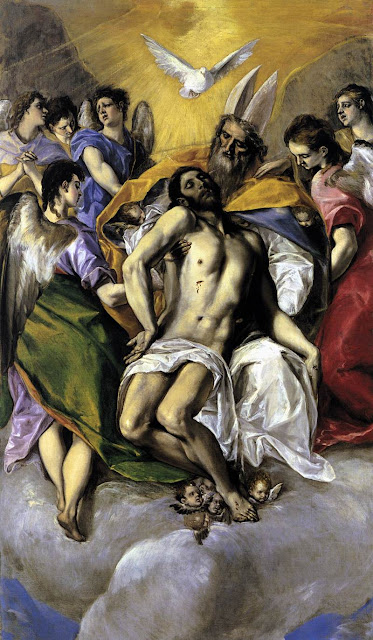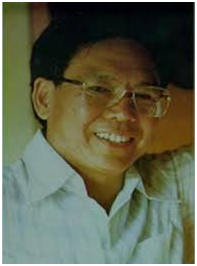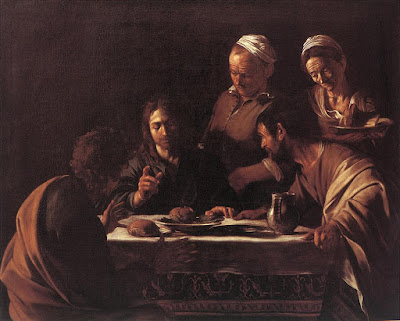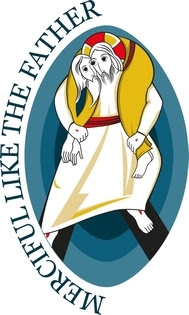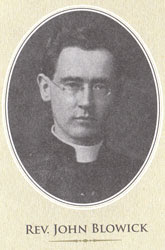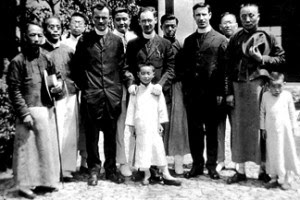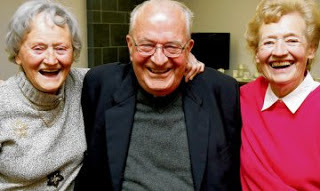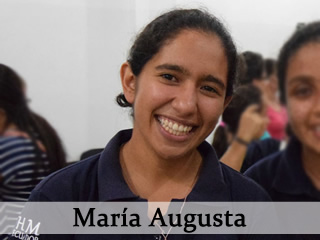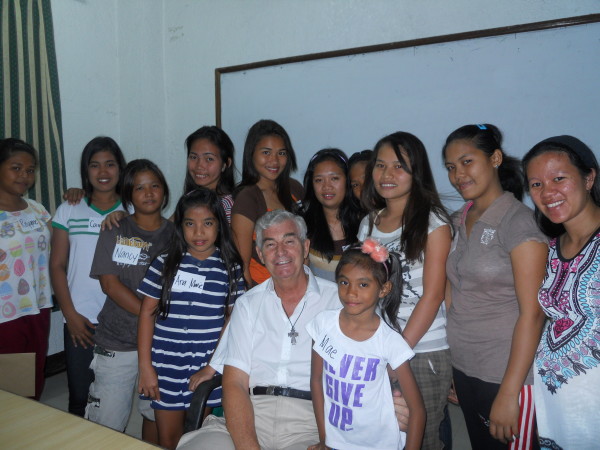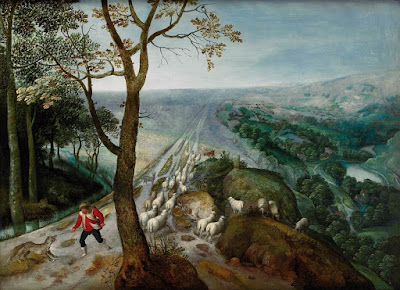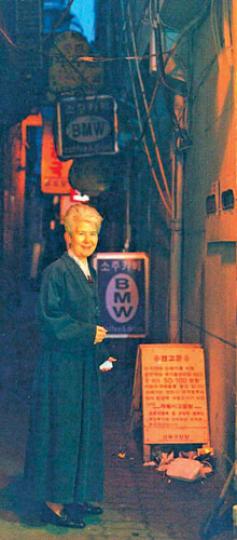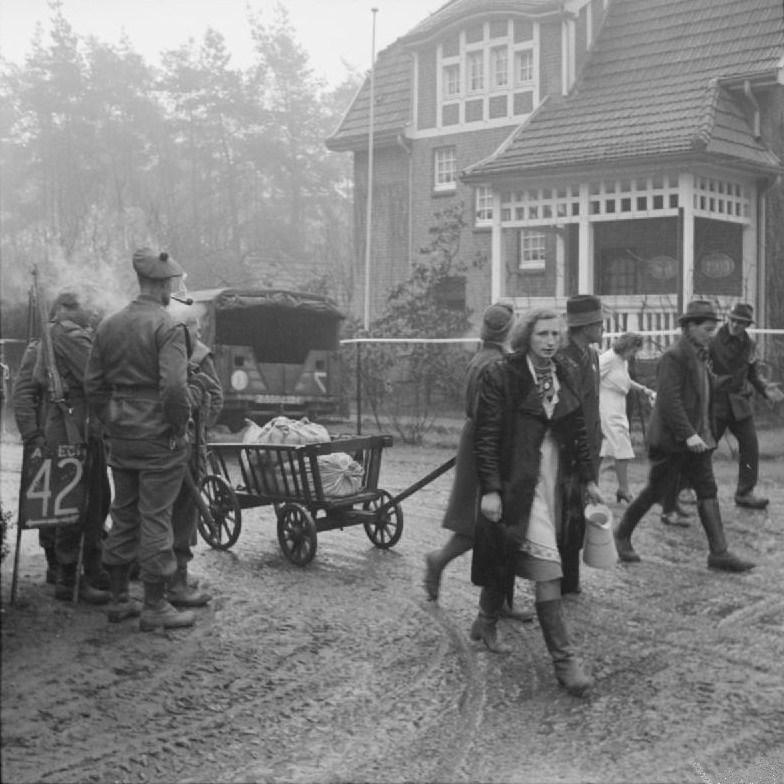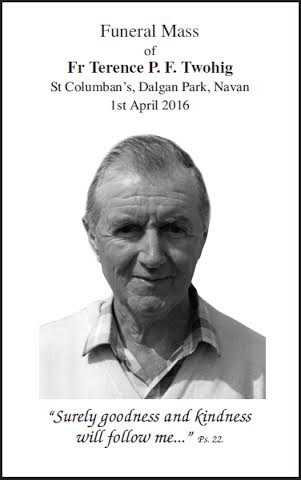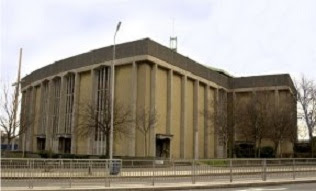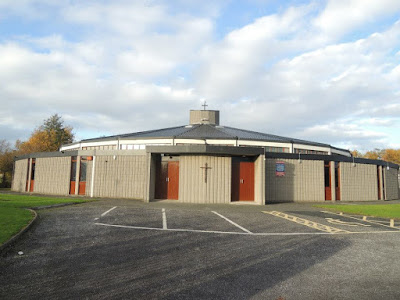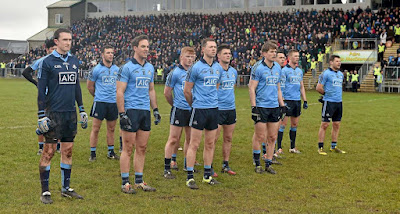The Gospel of John (2003) Directed by Philip Saville
Narrator: Christopher Plummer
Readings (New American Bible: Philippines, USA)
Readings (Jerusalem Bible: Australia, England & Wales, India [optional], Ireland, New Zealand, Pakistan, Scotland, South Africa)
Gospel John 21:1-19 [or 21:1-14] (New Revised Standard Version, Catholic Edition, Canada)
After these things Jesus showed himself again to the disciples by the Sea of Tiberias; and he showed himself in this way. Gathered there together were Simon Peter, Thomas called the Twin, Nathanael of Cana in Galilee, the sons of Zebedee, and two others of his disciples. Simon Peter said to them, “I am going fishing.” They said to him, “We will go with you.” They went out and got into the boat, but that night they caught nothing.
Just after daybreak, Jesus stood on the beach; but the disciples did not know that it was Jesus. Jesus said to them, “Children, you have no fish, have you?” They answered him, “No.” He said to them, “Cast the net to the right side of the boat, and you will find some.” So they cast it, and now they were not able to haul it in because there were so many fish. That disciple whom Jesus loved said to Peter, “It is the Lord!” When Simon Peter heard that it was the Lord, he put on some clothes, for he was naked, and jumped into the sea. But the other disciples came in the boat, dragging the net full of fish, for they were not far from the land, only about a hundred yards off.
When they had gone ashore, they saw a charcoal fire there, with fish on it, and bread. Jesus said to them, “Bring some of the fish that you have just caught.” So Simon Peter went aboard and hauled the net ashore, full of large fish, a hundred fifty-three of them; and though there were so many, the net was not torn. Jesus said to them, “Come and have breakfast.” Now none of the disciples dared to ask him, “Who are you?” because they knew it was the Lord. Jesus came and took the bread and gave it to them, and did the same with the fish. This was now the third time that Jesus appeared to the disciples after he was raised from the dead.
[When they had finished breakfast, Jesus said to Simon Peter, “Simon son of John, do you love me more than these?” He said to him, “Yes, Lord; you know that I love you.” Jesus said to him, “Feed my lambs.” A second time he said to him, “Simon son of John, do you love me?” He said to him, “Yes, Lord; you know that I love you.” Jesus said to him, “Tend my sheep.” He said to him the third time, “Simon son of John, do you love me?” Peter felt hurt because he said to him the third time, “Do you love me?” And he said to him, “Lord, you know everything; you know that I love you.” Jesus said to him, “Feed my sheep. Very truly, I tell you, when you were younger, you used to fasten your own belt and to go wherever you wished. But when you grow old, you will stretch out your hands, and someone else will fasten a belt around you and take you where you do not wish to go.” (He said this to indicate the kind of death by which he would glorify God.) After this he said to him, “Follow me.”]
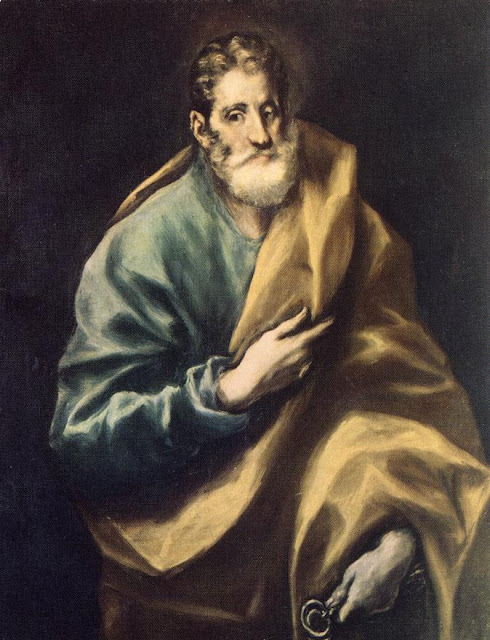
Apostle St Peter, El Greco, 1610-14
Museo de El Greco, Toledo, Spain [Web Gallery of Art]
I am using here the reflection I wrote three years ago for the same Sunday, with one or two minor changes. However, one line I wrote, near the end, doesn’t need to be changed, even though I was referring to events in 2013: Technically (the Korean War) has never ended and at this moment nobody is sure what North Korea is up to, its having raised tensions considerably in recent weeks.
When I turned 13 I wanted to be a pilot in the Irish Army Air Corps. With three or four classmates in O’Connell Schools, Dublin, run by the (Irish) Christian Brothers, now known in some places as ‘The Edmund Rice Brothers’, I was enthralled by the exploits of Biggles, a fictitious character created by Captain W. E. Johns. Biggles started his career in the Royal Flying Corps in World War I and was still flying, in the Royal Air Force, during World War II.
When I discovered that you needed some proficiency in physics my interest in being a pilot waned but my desire to be a military officer was still there. But ‘coming up from the rear’ was a desire to be a missionary priest. By the time I was 14 I knew that that was what I wanted to be.

Servant of God Fr Emil Kapaun
(20 April 1916 – 23 May 1951)
Around that time, or maybe when I was 15, I found a book in one of the branches of Dublin city’s public libraries about a man who had combined being a priest and an army officer, Father Emil Kapaun of the Diocese of Wichita, Kansas, who served as a US army chaplain in World War II and in the Korean War (1950 – 53). When his unit retreated after being attacked by Chinese soldiers Father Kapaun stayed behind with the wounded, knowing he would be captured. I was truly inspired by the accounts of how he had helped so many soldiers, giving them hope, strengthening their faith, sharing his pipe with them, scrounging for food and medicines, ie, ‘stealing’ them. He was taking the words of Jesus to St Peter literally: Feed my lambs . . . feed my sheep. One of the veterans in the video above tells how Catholics, Protestants and Jews were all saying the rosary every night.
At the beginning of the video we hear the voice of Father Kapaun himself speaking of the choice we must make ‘between being loyal to the true faith or of giving allegiance to something else’. His own choice led to his death in a North Korean prisoner of war camp, his last public act being a service at sunrise on 25 March 1951, Easter Sunday. One of those who carried him later to the camp ‘hospital’from which no ‘patient’ ever returned alive, recounts in the video how he was blessing his captors.
The first time I visited Korea, towards the end of September 1971 on my way to the Philippines, I was very conscious of Fr Kapaun when I celebrated Mass in the chapel of the Columban house in Seoul. On a visit there in 2015 I discovered that his name and the names of other US Army Catholic chaplains who died in the Korean War are on a plaque in our chapel. (Seven Columban priests who died in the War have been proposed for beatification as martyrs by the bishops of Korea).
On Thursday 11 April 2013, nine days before the 97th anniversary of his birth, Fr Kapaun was posthumously awarded the Medal of Honor, the USA’s highest award for valour, President Obama giving the medal to the priest’s nephew at the White House.
In 1993 Fr Kapaun was declared a ‘Servant of God’, the first step towards possible canonization, and on 29 June 2008 the cause for his sainthood was officially opened. The Diocese of Wichita has a website dedicated to this.

The Crucifixion of St Peter, Caravaggio, 1600-01
Cerasi Chapel, Santa Maria del Popolo, Rome [Web Gallery of Art]
In the gospel for this Sunday Jesus asks Peter three times, ‘Do you love me?’, adding ‘more than these’ the first time. When Peter professed his love each time Jesus told him to ‘feed my lambs’, ‘feed my sheep’. His tending the flock was not to be a ‘job’ but something done joyfully and wholeheartedly out of his relationship with Jesus. Yet it was to lead to the cross, just as Father Kapaun’s following of Jesus was to lead him to his death, which the Church may one day recognize as that of a martyr, like the death of St Martin I, who wasn’t directly killed but whose harsh treatment led to his death and whom the Church honours on 13 April.
Fr Emil Joseph Kapaun is an outstanding example of one who allowed Jesus to ask him, ‘Do you love me?’ and who answered ‘Yes’ with his very life, turning what was a man-made hell into a touch of heaven for the soldiers he was called to serve.
The Korean War began on 25 June 1950 and lasted till the ceasefire of 27 July 1953. Technically it has never ended and at this moment nobody is sure what North Korea is up to, its having raised tensions considerably in recent weeks. Perhaps we can invoke the intercession of Father Kapaun for peace in the land where he is buried. This prayer is from the website dedicated to the cause of his canonization.
PRAYER
Lord Jesus, in the midst of the folly of war,
your servant, Chaplain Emil Kapaun spent himself
in total service to you on the battlefields and
in the prison camps of Korea, until his
death at the hands of his captors.
We now ask you, Lord Jesus, if it be your will,
to make known to all the world the holiness
of Chaplain Kapaun and the glory of his
complete sacrifice for you by signs of
miracles and peace.
In your name, Lord, we ask, for you are the
source of peace, the strength of our
service to others, and our final hope.
Amen
All in the April Evening
Words by Katherine Tynan Hinkson, music by Sir Hugh S. Roberton, sung by the Glasgow Phoenix Choir
In temperate climes in the northern hemisphere Easter always occurs during spring. It is also lambing season for sheep. The symbolism in all of this is closely linked to the meaning of Good Friday and Easter Sunday.
All In the April Evening
All in the April evening,
April airs were abroad;
The sheep with their little lambs
Pass’d me by on the road.
The sheep with their little lambs
Pass’d me by on the road;
All in an April evening
I thought on the Lamb of God.
The lambs were weary, and crying
With a weak human cry;
I thought on the Lamb of God
Going meekly to die.
Up in the blue, blue mountains
Dewy pastures are sweet:
Rest for the little bodies,
Rest for the little feet.
But for the Lamb, the Lamb of God
Up on the hill-top green;
Only a cross of shame
Two stark crosses between.
All in the April evening,
April airs were abroad;
I saw the sheep with their lambs,
And thought on the Lamb of God.
Second Reading Revelations 5:11-14
Then I looked, and I heard the voice of many angels surrounding the throne and the living creatures and the elders; they numbered myriads of myriads and thousands of thousands, singing with full voice,
“Worthy is the Lamb that was slaughteredto receive power and wealth and wisdom and might
and honor and glory and blessing!”
Then I heard every creature in heaven and on earth and under the earth and in the sea, and all that is in them, singing,
“To the one seated on the throne and to the Lamb
be blessing and honor and glory and might
forever and ever!”
And the four living creatures said, “Amen!” And the elders fell down and worshiped.


